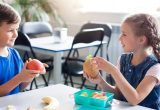
Considering the prevalence of overweight and obesity in children, the need for better supervision of marketing messages promoting the consumption of fatty, sweet and salty products is often emphasized (Santé Publique France, 2020). The measures proposed so far have focused on reducing screen time rather than promoting a critical debate around food marketing (Harris, 2009). Few days after World Education Day, Aprifel reviews a recent study demonstrating the effectiveness of a family-centered media literacy intervention. This program has led to healthier eating behaviours, including increased consumption of fruit and vegetables, among 9–14-year-olds.
Unlike younger children, teenagers do not necessarily eat healthy foods such as fruits and vegetables when they are available at home. Indeed, early adolescence is a period of empowerment when young people begin to make their own food choices. Young teenagers are influenced by the omnipresent marketing in their daily lives (television, social media, video games, etc.) and need to learn how to navigate in this highly mediated environment.
Current evidence suggests that media literacy (see box) and media education are effective in improving food choices (Evans, 2006; Buijzen, 2009). To provide more evidence, a team of U.S. researchers (W. Austin et al, 2022) tested the effectiveness of a family-centered media literacy program to promote fruit and vegetable consumption.
Providing a supportive family environment for discussion strengthens young teenagers critical thinking about the media
The results of this intervention show that creating an environment that supports parent-child discussion allows young people to take ownership of the subject and to strengthen their critical thinking skills regarding the media and the messages they convey. They are more likely to ask questions and to engage in discussions. By making this parent-child interaction easier, they can also see their parents as reliable sources of information about nutrition and media.
Improving young people’s critical thinking about media sources and content was an effective intervention in developing the skills needed to make decisions about food. Positive family interactions were associated with improved eating behaviours in youth. Findings showed that the increase in fruit and vegetable consumption among 9- to 14-year-olds was driven by a parent-child discussion about nutrition information that was initiated by the children.
It is interesting to note that this intervention led to results across the entire age range studied, although the older children made more progress on discussion initiation. These differences may be explained by the fact that children who acquire knowledge still need to challenge it and be motivated to apply it (Hwang, 2018). As shown in the intervention, this can be done productively through family discussion and parenting support that promotes the child’s autonomy.
Empowering youth by involving them as active research partners
The Convention on the Rights of Children in 1989 has emphasized that children are social actors who should be considered as essential for planning, implementation and evaluation of health research. However, few studies include them beyond that of research subjects.
Therefore, the present intervention is one of the first to involve young adolescents as active research partners and to focus on their perspectives. Consistent with the recommendations, children were involved in the design and evaluation of the program detailed in this study.
Based on the results presented earlier, youth’s active participation was effective in building their autonomy and encouraging self-initiated discussions.
An approach that can be applied to other science and health-related topics
This study provides interesting insights and provides a foundation for effective media education to improve eating behaviours.
Overall, these results suggest that there is a progress in critical thinking that can be catalysed through media education when children are encouraged to discuss media with their parents.
This model could be applied to media literacy education for science and health literacy, given that the principles for science literacy are similar to those for media literacy. Science literacy emphasizes likewise critical thinking, mainly the understanding of the multiple sources for information, and how data are collected and interpreted (Baker, 2020; McClune & Jarman, 2010; Ryder, 2001).
In its report “Literacy in the Information Age“, the OCED defined the concept of literacy as “the ability to understand and use written information in everyday life, at home, at work and in the community, to achieve personal goals and to extend one’s knowledge and abilities.
When applied to the media, media literacy therefore refers to the set of skills enabling an individual to evolve critically in the contemporary media environment. In other words, it is the ability to access, analyse and understand media in order to critically evaluate different aspects of the media and its content.




